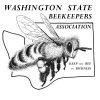
Washington State Beekeepers Association
Keeping the Bee in Business
2019 Legislative Success
Thanks to the consistent grassroots efforts of beekeepers across the state, liability protection for beekeepers is now the law in Washington. Thank you to all who contacted legislators; you made this success possible.
Here’s the whole law, short and sweet…
“A person who owns or operates an apiary, is a registered apiarist under RCW 15.60.021, and conforms to all applicable city, town, or county ordinances regarding beekeeping, is not liable for any civil damages for acts or omissions in connection with the keeping and maintaining of bees, bee equipment, queen breeding equipment, apiaries, and appliances, unless such acts or omissions constitute gross negligence or willful misconduct.”
Menu
Briefly, to be protected from liability, you must register with the state, obey the laws about beekeeping where you have your hives, and don’t do (or not do) something amounting to “gross negligence or willful misconduct.” This is the highest standard of liability available under law.
What does this standard mean to beekeepers? A brief search of Washington case law reveals nothing about bees and bee stings. We have, as a group, been responsible beekeepers so far. This also means there is no precedent about what is grossly negligent. So it’s up to us to be good beekeepers and manage our hives responsibly. We register with the state, we comply with zoning laws about placement of hives (whether city or county rules), and we do normal beekeeping management with our hives and don’t neglect that management. When this law gets applied in court, it will likely be a jury, listening to the parties, and to expert witnesses, who will decide what is gross negligence in beekeeping and what isn’t. So, as you care for your hives, do things that most beekeepers do, so that expert witnesses brought to court will agree that your actions are normal and not grossly negligent or willfully bad.
Observing zoning law restrictions on hive placement will be a large contributor to keeping us out of trouble. And doing those common sense tasks like swarm control will prevent us from being a problem for our neighbors.
We should continue to talk to our neighbors about our bees, why we keep them, what bees do for the neighborhood, and how bees rarely sting unless provoked. Helping others become more aware of honey bees (and the fact they are not wasps/yellow jackets) goes a long way toward making neighbors more comfortable. Finally, we should talk to neighbors who have water sources that attract bees like pools and hot tubs. I look forward to seeing better pollination in areas where folks previously were nervous to place colonies.